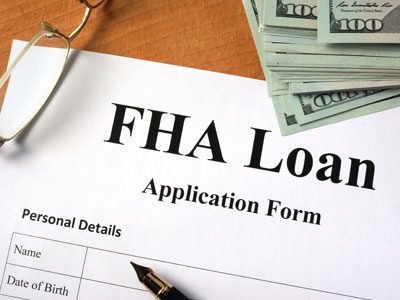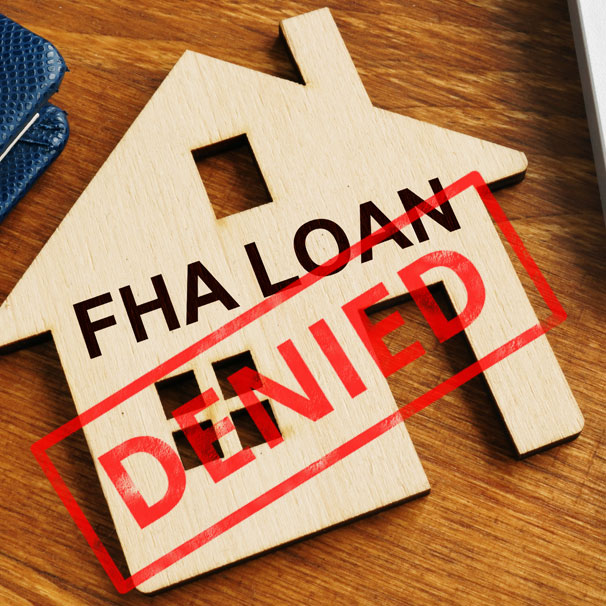Just because you apply for an FHA loan, it doesn’t mean you will automatically get approved. You may even meet two of the most commonly mentioned criteria required for an FHA loan – a good credit score and a minimum down-payment of 3.5%, but you may still get denied for an FHA loan.
Therefore, to provide an answer to a common question about FHA loans, that is, whether you can get denied for an FHA loan:
Yes, you can definitely get denied for an FHA loan if you don’t meet all their criteria for loan approval as determined by HUD and your mortgage lender.
If you’re worried about qualifying for an FHA loan, I’ve created an overview of the most common reasons why people get their application for an FHA loan turned down.
Who’s Involved in an FHA Loan?

It helps to understand the FHA loan structure if you know who’s who in a typical FHA loan. Typically, an FHA loan involves the following “players”:
The Borrower
That is you, the person asking for the funds in the first place to finance a home.
But who are you asking for the funds? Are you asking funds from the federal government (after all, FHA loans are backed by the federal government) or a private sector institution?
The Lender
It’s a common misconception that the lender is the Federal Housing Administration, when it fact, the FHA only insures lenders from borrower default and the funds are given by a bank, credit union or mortgage company.
The FHA
The FHA is a federal agency that’s managed by the Department of Housing and Urban Development (HUD). Loans made as part of the FHA mortgage insurance program are insured by the FHA, which means that in case of a borrower default, the private sector institution is insured by the FHA against financial loss.
When you ask for an FHA loan, you’re asking a bank or other private company to lend you the money. This transaction is insured by the FHA so that in case you are no longer able to pay, the private sector company won’t have to deal with the consequences of a loan default.
To get your FHA loan application approved, you must meet the guidelines of both the HUD and the lender. This means that you can get denied for an FHA loan in various stages of the loan process.
In essence, there are two stages in which you can get turned down for FHA financing, and I’ll discuss both these stages and the reasons why your application for an FHA loan may be denied.
As I mentioned there are two ‘points of failure’ in the loan process – the first is in the loan application process, which means you can get denied by the loan officer when you first apply for a loan, and the second is in the underwriting stage, where the underwriter may raise issues with your application.
Automated Borrower Evaluation
Borrowers are evaluated by the Automated Underwriting System (AUS), which is technically a computer program designed to make a “background” check based on several criteria including credit score, income, debt, etc.
The underwriter or loan officer simply enters your data into the system, which performs a check based on these criteria and can return a result to approve, reject or refer the borrower.
The approval is what everyone is hoping for and if the system returns this result, it means you’re eligible for an FHA and there were no red flags uncovered that would warrant concern.
A rejection is also a clear-cut answer – something in your credit score, debt, income level, etc. is not in order and you will not be approved for an FHA loan.
If the AUS returns a ‘refer’ result, it means that the underwriter will manually need to review your file and determine whether or not you qualify.
In this stage, there may be compensating factors that will explain the red flags raised by the system, allowing the loan process to progress to the next stage.
You may be asked to provide additional explanations or documentation, and once you satisfy those requests, your loan can move forward.
Or, in a worst-case scenario, it may be that the issues uncovered by the underwriter are serious enough to make you ineligible for a loan (e.g. too much debt) and they will deny your loan request.
Therefore, you may get an upfront rejection, or you may be rejected at the underwriting stage if you fail to provide documentation or explanation that could serve as compensating factors, or your financial situation is not in order to get qualified for a loan.

Common Reasons Why Your FHA Loan Request Will Be Denied
Here are the reasons why you can get denied for an FHA loan:
1. Bad Credit Score
FHA loans don’t require a perfect credit, but there is a minimum requirement of a credit score of 500 (typically it’s 580 but it can go as low as 500 if you can make a down-payment of 10%).
Even so, most lenders will prefer to see a credit score of 600 or above. Bad credit is one of the most common reasons why people get their FHA loan application denied.
2. Low Down-Payment
The minimum down-payment for an FHA loan is 3.5%. If you can’t make this payment or if the money cannot be sourced properly, you will get denied for an FHA loan. The down-payment can come from a gift, like when it’s offered by a family member.
3. Too Much Debt
Having too much debt is also a risk factor for the lender, plus it messes with your debt-to-income ratio, which is another criterion by which borrowers are evaluated.
If your DTI exceeds 43%, you may get turned down for a loan. There are lenders that will make an exception to this rule and potentially allow a higher DTI; however, most lenders will cap the DTI at between 45% and 50%.
4. Lack of Funds Needed for Closing
Besides the down-payment, you’ll also need to have enough funds in the bank to cover the closing costs. It doesn’t matter if these funds come from a gift or other legitimate income sources, but lack of either will prevent the loan from closing.
5. Property Appraisal Issues
Houses financed with an FHA loan go through a stricter appraisal process compared to the property appraisal carried out for conventional loans.
That’s because in addition to determining the value of the property, the appraiser also needs to make sure it meets the HUD guidelines. These guidelines are concerned with health and safety requirements that the property must meet.
If the appraiser raises issues regarding the safety and health (e.g. bedroom does not have egress, the roof is in a state of disrepair, walls contain lead-based paint, etc.) of the borrower, the loan will fall through at this stage.
Therefore, if the issues raised by the appraiser are correctable and the seller is willing to correct them, the loan can remain on track. If the issues are not correctable or the seller refuses to fix them, the loan will be denied.
6. Bankruptcy or Foreclosure
While a past event of bankruptcy or foreclosure isn’t an impediment in getting approved for an FHA loan, a recent event of any of these is a reason for rejection.
In case of bankruptcy, you must wait 2 years before you can apply for an FHA loan, while in the case of foreclosure, you must wait 3 years. During this time, you must work on your credit score and prove that you’ve become financially responsible.
There are exceptions, however, if you can prove extenuating circumstances that would demonstrate that the bankruptcy or foreclosure happened because of circumstances beyond your control.
7. Other Risk Indicators
The cases I discussed so far are all capable on their own to cause your FHA loan approval to be denied. But systemic financial issues and a combination of other risk factors deemed as such by your lender can also get your loan request denied.
In Summary…
To recap, getting denied for an FHA loan is possible if you don’t meet the criteria established by the FHA and your mortgage lender.
You can get rejected by the loan officer up front when you’re submitting your loan application, or you can get rejected in the underwriting process if the underwriter uncovers issues that would bar you from getting a loan.
In the underwriting stage, you may be required to submit documents, provide explanations and clarifications regarding some flags raised by the underwriter. If you submit these and the underwriter is satisfied, the loan process will proceed.
These are the most common reasons for FHA loan rejection, but there can be other issues too that might delay the loan or cause it to fall through (e.g. problems raised during appraisal).
Overall, you shouldn’t be discouraged, especially that HUD will accept compensating circumstances and exceptions to their rules, and therefore just because an issue is raised, it doesn’t mean you won’t get your loan approved.
